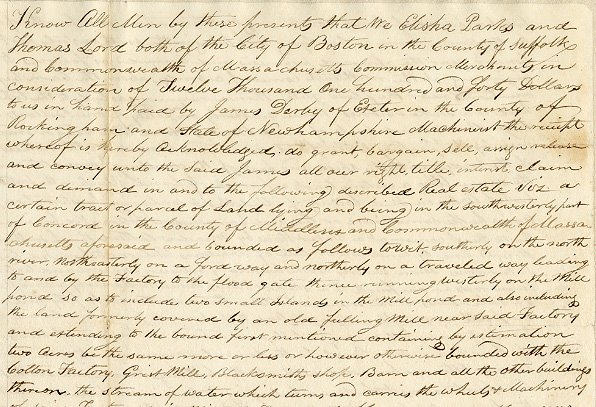

2. Roger and John Brown and the Beginning of Factory Village
Roger Brown, a “clothier,” arrived in Concord in 1776 and bought a small piece of land on the Assabet River. He came from Framingham, where his father had operated a fulling mill and where he had learned the process of fulling cloth. By 1786 he had acquired enough land to build his own mill, as well as establish a farm. Little is known about the appearance of Brown’s mill, except that it was on a small island in the Assabet River, then called the North River.
Roger’s son John, born in Concord in 1783, followed his father into the business. In 1806 his father sold him a piece of land and a one-third interest in the mill. John didn’t build on the land until just before his marriage in 1812. But in 1808 he formed a partnership with his cousin Ephraim Hartwell of New Ipswich, New Hampshire to build a cotton factory on the river. Charles Edward Brown, John Brown’s grandson, would later describe the factory as being made of wood, one hundred feet long, twenty-eight feet wide, and five stories high, including the basement. There was a tower on the side nearest the mill and the raceway ran beneath the building.
Ephraim Hartwell died in 1816. His grandson, Ephraim Hartwell Bellows, had become a third partner in the business in 1813. In 1817, during a business decline, John Brown sold a major portion of his interest in the mill to Ephraim Bellow’s father, Caleb. When Caleb died in 1823, Ephraim Bellows purchased his interest, giving him major control of the mill. Over the years, Brown and Bellows partnership had sometimes been tense, and in 1824, Brown sold out to Bellows. Bellows, however, did not pay, and Brown was forced to sue him for the money. Bellows eventually paid, and then sold controlling interest in the mill to Boston commission merchants Thomas Lord and Elisha Parks, agents who bought and sold properties on a commission basis. (The 1831 deed here shown—drawn from the library’s collection of Damon family papers—documents the sale of property by Bellows to Lord and Parks.) They quickly sold the entire operation to James Derby of Exeter, New Hampshire. John Brown spent the remainder of his life on his Concord farm.